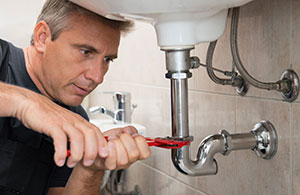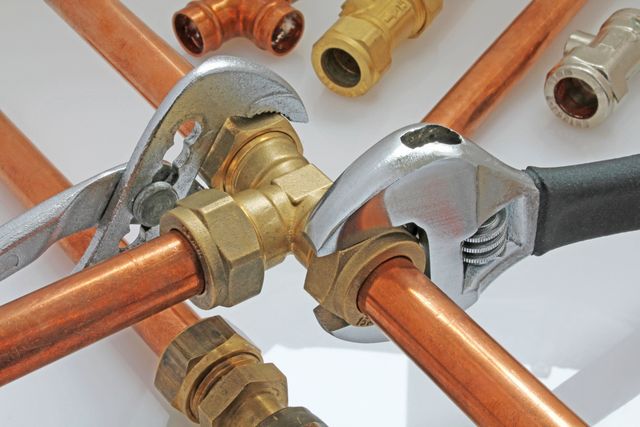Important Fixes for Emergencies: How to Until Support Arrives
Important Fixes for Emergencies: How to Until Support Arrives
Blog Article
Any individual has got their own unique theory in relation to What to Do While Waiting for an Emergency Plumber.

Pipes emergency situations can strike any time, causing tension and prospective damage to your home. Whether it's a burst pipeline, a stopped up drainpipe, or a dripping tap, recognizing how to manage the situation until a professional plumbing shows up can save you from additional problems. This post supplies necessary emergency situation pipes ideas to assist you alleviate damages and gain back control during a plumbing dilemma.
Turn Off the Water Supply
The first step in any plumbing emergency situation is to shut down the water. For local problems, such as a leaking faucet or toilet, turn off the shutoff near the component. When it comes to a significant leak or burst pipe, situate your home's major water shut-off shutoff and turn it off right away. Knowing the location of these shutoffs ahead of time can conserve important time during an emergency.
Shut down Your Hot Water Heater
In specific emergencies, such as a burst pipeline, it's smart to turn off your water heater. This protects against getting too hot or damage to the unit when water quits moving. Shut off the power supply to the water heater (electrical or gas) and allow it cool down to avoid possible dangers.
Temporarily Quit a Ruptured Pipe
A ruptured pipeline can result in significant water damages in minutes. To mitigate the concern:
Call a specialist plumbing technician right away to address the trouble permanently.
Have an Emergency Situation Plumbing Package
Prepare a fundamental pipes emergency situation kit to manage minor problems effectively. Your package should consist of:
Having these devices on hand can make a significant distinction in your capacity to handle emergency situations.
Unclog Drains Securely.
A clogged drainpipe can be a frustrating and untidy concern. Here's exactly how to tackle it:.
If these methods don't function, stay clear of using excessive force, as it may aggravate the clog.
Take Care Of Overflowing Toilets.
An overflowing toilet can trigger instant disorder. Right here's what you need to do:.
Address Tiny Leakages with Short-lived Solutions.
Tiny leakages can promptly come to be significant problems if left unchecked. Use these temporary fixes until professional help arrives:.
While these repairs aren't long-term, they can help minimize water loss and damage.
Take Care Of Frozen Water Lines Very Carefully.
In chillier climates, frozen pipelines are a common emergency situation. If you believe an icy pipe:.
Know When to Call a Specialist.
While quick fixes can assist temporarily, particular pipes issues call for instant expert attention. Call a plumbing professional if:.
Without delay calling a professional makes sure the issue is settled properly and prevents additional complications.
Protect against Further Damages.
Taking quick activity to reduce damages can save you money and time in the long run. Below's how:.
Conclusion.
Plumbing emergency situations can be overwhelming, however with the appropriate knowledge and tools, you can take care of the situation successfully up until aid arrives. By shutting off the water, dealing with little leakages, and using momentary solutions, you can minimize damage and keep your home safe. Keep in mind, these pointers are short-term options; constantly consult a certified plumbing technician to take care of the root cause of the issue. Prep work and fast reasoning are your best allies in any kind of pipes emergency.
8 Helpful Tips for Managing Plumbing Emergencies at Home
If your plumbing system hasn’t failed once, wait for it because almost everyone has a story to tell. Sometimes, it could be simple emergencies such as a leaking pipe, a blocked cistern, or even a big burst pipe. In situations like this, you need to have some handy tips to save you some money and from possible damages.
Take care of minor issues early.
Sometimes, you could have avoided an emergency by taking proactive measures while it was still early. Some major plumbing emergencies can be a result of an ignored minor issue. We recommend that you have items like plumbing tapes and other related items. A plumbing tape can allow you to manage minor leaks before the plumber arrives.
Cut off the water supply.
This tip is essential in almost any type of leakage problem. For problems like minor leakages in the toilet or kitchen, turn off the supply that takes water to the affected pipes. If the leakage is a major pipe, you must shut off the supply valve to the entire building. This will help you avoid flooding your home and neighbors if you share a flat.
Know your plumbing system
Folks typically move into a new apartment without understanding the water supply around the building. This can prove disastrous if a water emergency arises and the plumber is far away. The previous tip will prove useless if you don’t practice this one. More importantly, know where your water shut-off valve is located – you’ll need that knowledge to prevent potential home floods.
Have some common handy tools
There are lots of plumbing emergencies that you can handle without hiring a plumber. That’s why you must keep some tools available always. Some tools that you can use to fix simple plumbing emergencies easily include plumbing tapes, screwdrivers, thread seal tapes, plungers, pliers, tape measures, and rubber gloves.
Insulate your pipes from cold
You’ll save yourself from many plumbing expenses if you protect your water pipes from the cold. This is because of the harmful effects that cold weather can have on your pipes. During winter, your pipes can burst from being overly expected to freezing temperatures. So, make sure insulators are there to keep the pipes working correctly.
Avoid practices that will clog your toilet.
Many people indulge in practices that can damage the plumbing system of the entire building. One of these is when they use their toilet to dispose-off garbage. They flush all kinds of things, such as paper towels, bandages, hairs, female sanitary products, etc., down the toilet. This will block your toilet in the long run, incurring unnecessary expenditures. Dump such waste in the trash instead.
Check your dials regularly.
Sometimes, there could be leakages in your home without noticing them in time. So, constantly monitor your water meter dial. If the dial is reading when there is nobody using water, this is an indicator that there is leaking. Check for leaks immediately. Call a plumber as soon as possible if you can’t find any.
https://www.constructionplacements.com/8-helpful-tips-for-managing-plumbing-emergencies-at-home/

I have been very fascinated with What to Do During a Plumbing Emergency and I hope you enjoyed reading the new article. Please take the opportunity to promote this blog post if you enjoyed reading it. I praise you for being here. Return soon.
Call Today Report this page